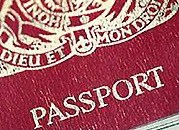10,000 UK passports issued to fraudsters and terrorists
Home office admits major bungle as genuine passports get issued to convicted terrorists.


Sign up today and you will receive a free copy of our Future Focus 2025 report - the leading guidance on AI, cybersecurity and other IT challenges as per 700+ senior executives
You are now subscribed
Your newsletter sign-up was successful
Ten thousand passports were fraudulently obtained by criminals, the Home Office admitted. The department is to set in motion new plans to crack down on abuses of the system.
The Home Office said that of the 6m passports applied for last year 16,500 were fraudulent. Of those 6,500 were detected by the Identity and Passport Service (IPS), while the other 10,000 got through.
Worryingly, nine passports were issued to Dhiren Barot, who received a life sentence in 2006 for plotting to kill tube travellers with a "dirty" bomb. He had successfully obtained seven passports in his name and another two using fraudulent IDs.
Another two passports were issued to Salaheddine Benyaich, a Moroccan man in prison for 18 years for his part in the 2003 Casablanca bombings, which claimed 44 lives.
From May, new passport applicants must attend a personal interview at which they will have to prove their identity. Applicants will be asked questions about their family and financial history as well as addresses where they have lived.
Tory shadow Home Secretary David Davis said that it was outrageous that the government managed to issue passports to convicted terrorists. "This undermines the government's case for their expensive ID card system."
"What is to say they won't issue genuine ID cards to terrorists or that terrorists will not use fraudulent passports to obtain genuine ID cards?" he said.
Sign up today and you will receive a free copy of our Future Focus 2025 report - the leading guidance on AI, cybersecurity and other IT challenges as per 700+ senior executives
Security experts said the real focus should be on the quality of information officials have to make good decisions over whether to issue passports.
"It is highly likely that a significant proportion of these errors can be put down to poor collaboration across departments," said Tim Holyoake, senior consultant at software firm Software AG. "The information needed to improve decision making is often available, but officials don't have the ability to easily cross-reference."
He said that technology exists to make information sharing easier now as well as in future, as priorities change and this would lead to better decision-making as a direct consequence.
"This problem needs to be addressed now, with focus on ensuring the existing systems and processes make full use of the information available, before a simple information oversight escalates into a national disaster," said Holyoake.
Rene Millman is a freelance writer and broadcaster who covers cybersecurity, AI, IoT, and the cloud. He also works as a contributing analyst at GigaOm and has previously worked as an analyst for Gartner covering the infrastructure market. He has made numerous television appearances to give his views and expertise on technology trends and companies that affect and shape our lives. You can follow Rene Millman on Twitter.
-
 Ransomware protection for all: How consumption-based subscription models can lower the entry point for cyber resilience
Ransomware protection for all: How consumption-based subscription models can lower the entry point for cyber resilienceIndustry Insights Consumption-based immutable backup makes enterprise-grade ransomware resilience affordable to all
-
 Zyxel NWA50BE Pro review
Zyxel NWA50BE Pro reviewReviews The NWA50BE Pro offers a surprisingly good set of wireless features at a price that small businesses will find hard to resist
